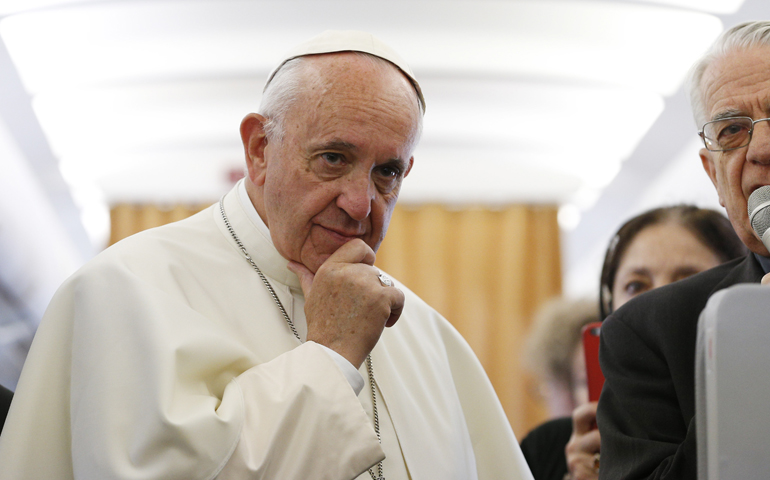
Pope Francis is pictured while meeting journalists aboard his flight from Rome to Yerevan, Armenia, June 24. The pope was beginning a three-day visit to Armenia. (CNS/Paul Haring)
Pope Francis has said the United Kingdom's vote to leave the 28-member European Union entails a "great responsibility" to respect the will of the British people while maintaining "the peaceful coexistence of the entire European continent."
In brief remarks aboard the papal flight to Armenia Friday morning -- just hours after final reporting indicated Britain had voted by 51.9 percent to leave the EU -- the pontiff said the vote was "the will expressed by the people."
"This requires a great responsibility on the part of all of us to guarantee the good of the people of the United Kingdom as well as the peaceful coexistence of the entire European continent," the pope continued. "This is what I expect."
Francis was speaking Friday as global markets plummeted throughout the morning on the news of the British vote, and as it raised wide fears of a larger fracturing of the half-century of European integration following the Second World War.
Within an hour of the official tally of the British vote, Dutch conservatives called for their own referendum on EU membership and nationalist parties in France and Italy praised the British move.
The vote could also cause a fracturing of the structure of the United Kingdom itself, with both Scotland and Northern Ireland widely wishing to stay in the EU.
Related: Scotland's assertive Catholics weigh up independence
North Ireland Deputy First Minister Martin McGuinness, a member of the Sinn Fein political party, said that his party would seek a vote to leave the UK and unify with the Republic of Ireland, an EU member.
Scottish National Party Leader Nicola Sturgeon said Scotland should consider a new referendum on its own independence.
The UK held a referendum on Scottish independence in September 2014. While 55.3 percent voted then to remain in the UK, Sturgeon and other political leaders have said that vote presupposed UK membership in the EU.
With all precincts reporting Friday morning, more than 17 million Britons voted to leave the EU. About 15.9 million voted to stay. Following the news, the value of the British pound hit its lowest level in 40 years.
While Francis has criticized the European Union in the past, he has also called it a model for how nations can create solutions together to avoid repeating past violence.
In accepting the prestigious German Charlemagne award in May, he said the EU had “dared to change radically the models that had led only to violence and destruction."
On Friday the pontiff also expressed happiness at news that the country of Colombia had signed a tentative peace agreement with FARC militants, who have been fighting a guerilla war against the government since the 1960s.
"I am happy of this news that arrived yesterday," said the pope. "More than 50 years of war and guerilla warfare -- so much blood spilled. Beautiful news."
Francis has said before that should the peace deal prove successful he plans to visit Colombia some time in 2017.
The pontiff is visiting Armenia Friday-Sunday on his 14th visit outside Italy since his election in March 2013.
Upon landing in the country Friday afternoon, the pope is to meet with the leader of the Armenian Apostolic church, an Oriental Orthodox community that includes some 93 percent of Armenia's population of three million.
Francis will also meet Friday with President Serzh Sargsyan and the country's political leaders. On Saturday, the pope will visit the country's memorial to the World War I-era killings of some 1.5 million Armenians.
The pope caused a diplomatic kerfuffle with Turkish leaders last year when he described the killings as the first genocide of the 20th century, a description Turkey has long resisted.
[Joshua J. McElwee is NCR Vatican correspondent. His email address is jmcelwee@ncronline.org. Follow him on Twitter: @joshjmac.]
